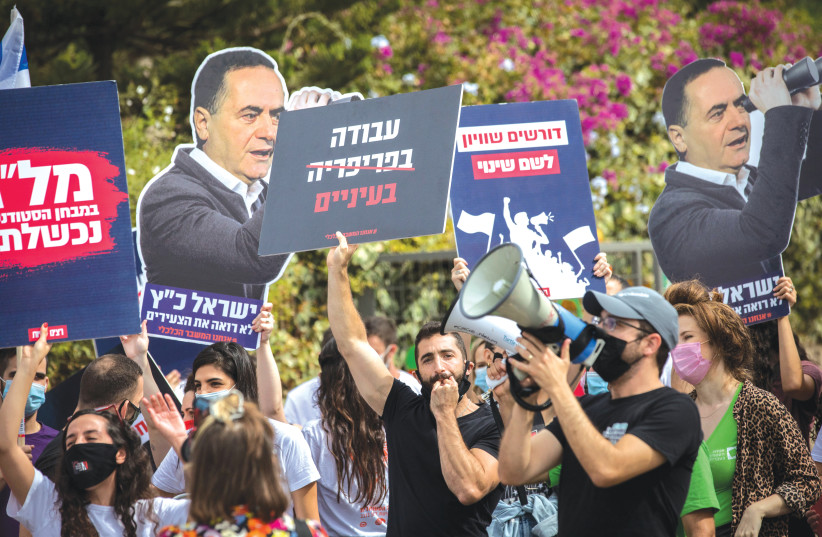The academic school year in universities will finally open on Sunday after being postponed four times due to the October 7 massacre and the outbreak of the Swords of Iron Operation.
The academic year will start while many students are still in reserve duty and includes a two-phase plan to assist them.
The Council for Higher Education in Israel said that approximately 55,000 students are on reserve duty, making up about 18% of the total student body of 332,000. The Student Union, however, estimated this figure to be higher: around 70,000.
CHE data also revealed that about 3,000 academic and administrative staff – roughly 8% of the workforce in the budgeted higher education system – are serving as reservists.
Education Minister Yoav Kisch and the council have directed academic institutions to provide comprehensive support to reservist students, ensuring their successful completion of the academic year.
As outlined by Prof. Arieh Zaban, chairman of the Committee of University Heads, a specialized second semester for reservists is set to start on January 20, aligning with the IDF’s projections for the release of most reservist students by this date.
As an example of the help being given to reservists, Tel Aviv University has developed a comprehensive plan to support those students serving in the army. This includes a range of academic adjustments, such as course exemptions, binary verbal grading, and flexible examination schedules.
In a strategy reminiscent of the COVID-19 era, all lectures will be recorded and made accessible for students to view at their convenience. Additionally, the university is committed to bolstering support through enhanced practice sessions and small group learning. Faculty members are volunteering in droves to assist reservist soldiers, offering personalized, one-on-one, and group learning experiences.
Tel Aviv University President Prof. Ariel Porat stressed the importance of timely commencement of the academic year.
“Delaying it further would adversely affect all students, including those serving as reservists,” he said in a statement. “The university, in collaboration with other academic institutions, is actively working with the military to maximize the release of reservist students in time for the start of the year.”
In 2023, the total student enrollment across all degree levels in higher education institutions was 331,170, including 254,075 in bachelor’s degree programs, 65,310 in master’s programs, and 11,785 in doctoral programs. Breaking down the undergraduate enrollment, 35% attended universities, 17% were at the Open University, 40% at academic colleges, and 8% at academic colleges for education.
This stabilization in student numbers followed a significant increase in demand for higher education in 2021, a spike attributed to the COVID-19 pandemic. That year saw an addition of roughly 24,000 students. In 2023, the numbers decreased slightly, aligning more closely with pre-pandemic levels.

Enrollment breakdown
The hi-tech field continues to see an uptick in student enrollment in 2023, with a particularly notable increase in female participation. In the prior academic year, there were 37,650 engineering students, constituting about 18% of all undergraduates at universities and academic colleges.
Additionally, 22,290 students were enrolled in first-degree programs in mathematics, statistics and computer science, totaling around 59,940 students in technology-related fields, which are in high demand in the hi-tech sector and account for about 29% of all undergraduates.
The medical field has also seen growth: The number of new medical students has risen from 530 at the start of the past decade to 910, and nursing students in their first year have doubled from 1,000 to 2,000.
Women continue to make up a growing proportion of the academic population, now at around 60%. This increase is significant across all degrees – 59% in bachelor’s programs, 65% in master’s, and 54% in doctoral programs. In hi-tech studies, the number of women has nearly tripled since 2010, from 2,620 to 7,720 in first-degree computer science programs, including mathematics and statistics. Furthermore, the number of female engineering students grew by 48%, from 8,580 in 2010 to 12,700 in 2023.
About 66,250 students came from socioeconomically disadvantaged backgrounds last year, roughly a third of all undergraduate students. Their representation is particularly high in budgeted academic colleges, where they comprised 39% of undergraduate students, aligning with the 40% of the overall population living in these clusters.
Arab students, who represent about 19% of all students in Israel, totaled 61,550 in the higher education system in 2023, compared to their 21% share in the overall population. This is a 137% increase from 2010.
Lastly, the number of students of Ethiopian descent has increased by more than 50% since 2015 – from 2,940 to 4,500 in the last year. However, their percentage among students is still slightly lower than their proportion in the general population, at 1.5% compared to 1.7%.
